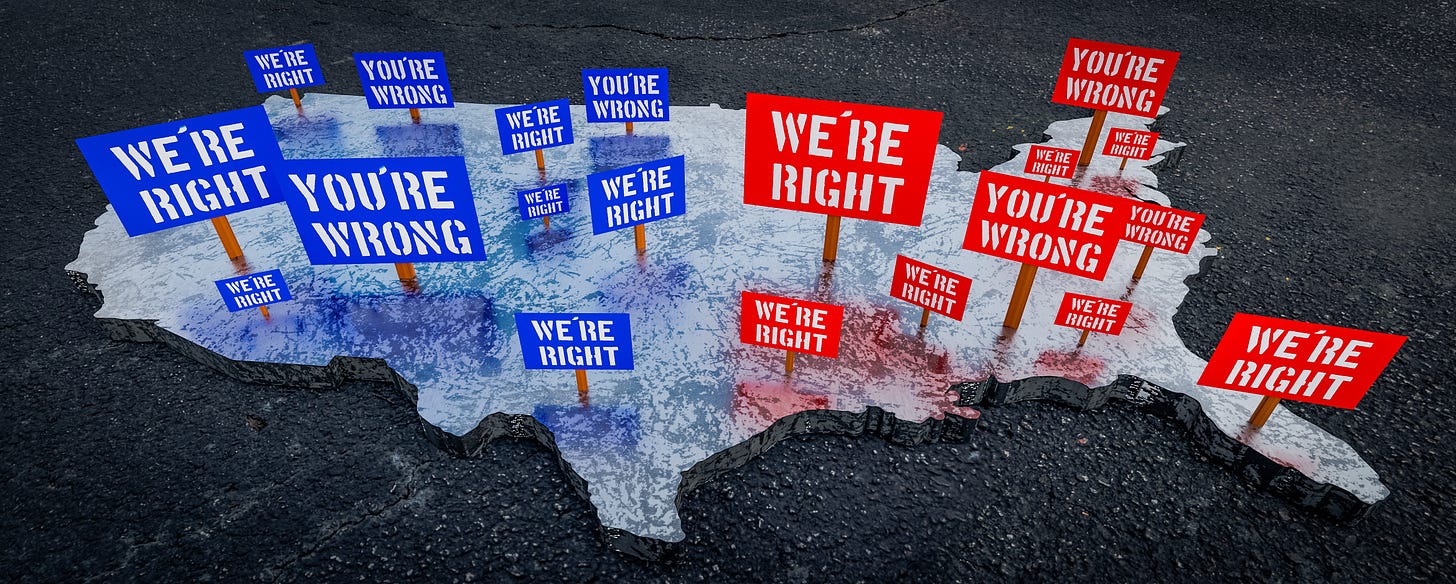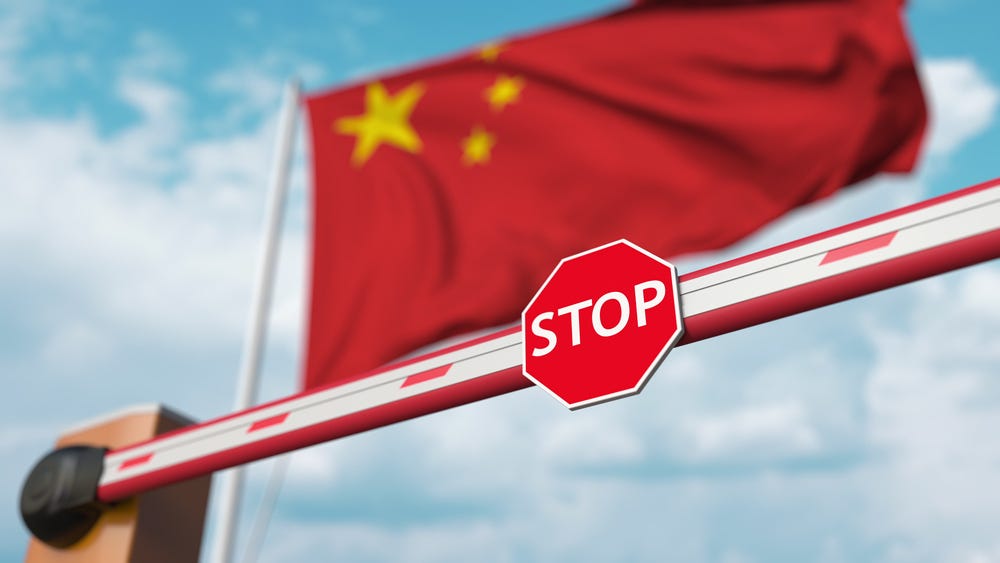E-Pluribus | June 21, 2023
Disagreeing with your own tribe makes you an enemy; China's long arm of censorship gets slapped back; and defining denialism down.
A round-up of the latest and best writing and musings on the rise of illiberalism in the public discourse:
Kat Rosenfield: If I Disagree with My Liberal Tribe, Does That Make Me A Conservative?
The debate over whether certain books should be allowed in public school libraries represents another flash point in the culture. Yet, as Kat Rosenfield argues at The Boston Globe, whether a book depicting a sexual act should be at the fingertips of children would not have been a partisan/ideological issue several years ago. Yet now, your position on this and other culture war issues has become a defining feature of one’s political identity, regardless of your beliefs on other issues.
This is all happening at a moment when politics is increasingly defined by negative polarization and a with-us-or-against-us mindset in which anyone who doesn’t fully support every last tenet of a given ideology is deemed a member of the loathed outgroup. We saw how this played out in 2016 with Republicans who wouldn’t get on board the Trump train, but it is also how lifelong liberals — the kind who have been voting Democratic for more than 20 years and believe passionately in free speech, legalized drug use, abortion rights, criminal justice reform, universal health care, and LGBTQ equality — can suddenly find themselves nonconsensually categorized as far-right fascists (or the dangerous enablers thereof) for being critical of this or that new left orthodoxy. Even the words “liberal,” “conservative,” “left,” and “right” have been disassociated from anything so concrete as party affiliation or policy preference; instead, they denote what we’re against. A liberal is a person who is anti-conservative; a right-winger is anti-left.
And as for the issues, the current vogue is to stake out whichever position renders us diametrically opposed to our perceived ideological enemies — even when that position is, not to put too fine a point on it, phenomenally stupid. This oppositional-defiant mindset became ascendant during the pandemic, in which liberal support for the COVID shots led conservatives to refuse to be vaccinated, while Donald Trump’s support for reopening schools caused a reactionary left to double down on keeping them closed indefinitely. But now, it’s everywhere. If the other guy loves it, we hate it; if the other guy hates it, we’ll take all you’ve got. This is how a bespoke Bud Light can featuring the face of trans TikTok influencer Dylan Mulvaney sparked a mass backlash from conservatives who all but boycotted the brand into submission. This is why Dave Chappelle’s recent comedy specials were panned by liberal critics and yet earned raves from normie audiences.
And this is why, if conservatives don’t want a sexually explicit comic book in the school library, suddenly it becomes a matter of national urgency to liberals that every child be able to read it.
For some people, the ones who root for their chosen political party with the same loyal fervor they do their hometown baseball team, I would imagine none of this seems especially problematic. Even if you don’t necessarily agree with something coming from your political tribe, it’s not so hard to pretend otherwise. After all, how important is the presence (or absence) of any one book in a school library, really? Why not just go along to get along?
And yet the outsize role that controversies like this play in the cultural discourse suggests that it does matter, at least in principle. It is difficult, when you believe something isn’t true, to pretend you think it is. It is also alienating to be told that you must pretend — actively, vocally, publicly — if you’re to remain in good standing with your political tribe. Even people who would never in a million years vote for a Republican candidate tend to get rankled by the notion that they are required to espouse beliefs they don’t hold or risk getting kicked out of the liberal clubhouse.
Read it all here.
Jillian Kay Melchior: China Tries to Cancel Badiucao’s Art Show in Poland
I wrote here in 2021 about how the Communist Chinese government’s Sauron-like long arm tries to exert influence around the world to quash criticism and unfavorable news about itself. Jillian Kay Melchior writes at the Wall Street Journal about a recent example out of Poland that fortunately got the pushback it deserved.
A senior Chinese diplomat visited the Centre for Contemporary Art in Poland’s capital with an ultimatum: A planned exhibit by Chinese-dissident artist Badiucao “hurts the feelings of the Chinese people and it should not be opened,” museum director Piotr Bernatowicz says the diplomat told him. “It could destroy the good relations between China and Poland.”
[ . . . ]
China often attempts to censor speech abroad that’s critical of the Communist Party. Venues in Italy and the Czech Republic defied similar pressure to cancel Badiucao exhibits. The artist, who keeps his real name secret, lives in exile in Australia, where he is a citizen. He says no Australian museum has been willing to host an exhibit of his art, in part because left-leaning administrators are cowed by Beijing’s accusations of anti-Chinese racism.
Badiucao’s experience in Warsaw, however, appears to have stiffened Canberra’s spine. Australia’s Department of Foreign Affairs said in a statement that Ambassador Lloyd Brodrick met with the artist before the exhibit opened to discuss his “work, his concerns in relation to personal safety, and the support the Australian government was providing.” Badiucao announced Monday that he was awarded a grant funded by the government for a politically themed graphic novel.
In remarks at the opening of the Warsaw exhibit, Badiucao noted how the fates of Poland and China diverged in 1989 as the Poles threw off communism while Beijing slaughtered protesters in Tiananmen Square. “Every communist regime is similar,” Mr. Bernatowicz told me. “They try to block other types of narratives, and they try to control the narratives of their country.”
Read the whole thing.
Jonathan Kay: In Canada, Asking for Evidence Now Counts as ‘Denialism’
Seeking the truth should be considered a noble pursuit, but Jonathan Kay reveals in Quillette that in the case of the Kamloops school “mass graveyard” in Canada, simply asking for evidence that such a graveyard really exists is considered beyond the pale.
It’s now been more than two years since Canada was convulsed by claims that 215 unmarked graves of Indigenous schoolchildren had been discovered on the grounds of a former residential school in Kamloops, British Columbia. No actual bodies or human remains were in evidence—just ground-penetrating radar data indicating regularly-spaced soil dislocations. But you wouldn’t have known that from the breathless manner in which the story was reported at the time. A Global News headline announced the “Discovery of Human Remains at Kamloops Residential School Grounds.” Another, at the Toronto Star, declared, “The Remains of 215 Children Have Been Found.”
[ . . . ]
Twenty-four months later, much has changed. During this entire period, not a single unmarked grave, body, or set of remains is known to have been found at Kamloops, nor at any of the other First Nations communities that conducted similar ground-penetrating radar surveys.
[ . . . ]
Even some foreign media sites have failed to correct their reporting. On May 28th, 2021, a New York Times reporter named Ian Austen told readers that a “mass grave” containing Indigenous children had been “reported in Canada.” In fact, not only had no “mass grave” been found, but no Indigenous community had made such a claim. The leader of the First Nations community being referenced explicitly told the media there was no mass grave, and disavowed usage of the term.
It’s been two years since the Times ran this claim, with no correction forthcoming. Nor has the Times corrected an equally bungled 2021 follow-up report by the same author, the sub-headline on which referred to “the discovery of the remains of hundreds of children.” No “remains” had been discovered, either then, or now.
The desire to protect the unmarked-graves narrative remains especially strong among Canada’s ruling Liberals, whose Minister of Crown-Indigenous Relations has taken the rather extraordinary step (for a liberal democracy, at least) of instructing reporters not to report heretical facts. In early 2022, when a few writers began saying out loud how odd it was that no bodies had yet been discovered in Kamloops, the minister, one Marc Miller, denounced these Canadians as being “part of a pattern of denialism and distortion that has coloured the discourse on Residential Schools in Canada. They are harmful because they attempt to deny survivors and their families the truth.”
Miller’s suggestion here is that “the truth” of the graves’ existence should be taken as a matter of faith by those of pure (political) heart, regardless of what evidence happens to be available. By adding in the word “denialism,” Miller plainly seeks to compare those of impure heart to holocaust deniers.
Read it all.
Around Twitter
Bertrand Cooper has written “The Failure of Affirmative Action” for the Atlantic:
While there are legitimate concerns in this country about government monitoring of speech in the name of “dis-” and “mis-information,” here’s a reminder of what something as simple as a tweet can mean in other countries (click here to play the video):
And finally, Matt Yglesias sums up the tumultuous year of 2020. That’s going to leave a mark…









